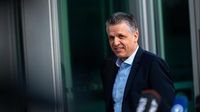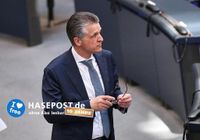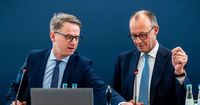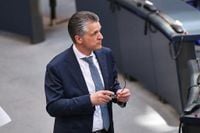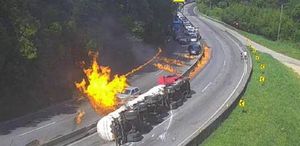In a striking political development, the Alternative für Deutschland (AfD) has drawn level with the Christian Democratic Union/Christian Social Union (CDU/CSU) in recent polls, indicating a significant shift in the German political landscape. As the Union and the Social Democratic Party (SPD) continue their coalition negotiations, pressure mounts for a decisive policy shift that resonates with the electorate's demand for change.
According to a survey conducted by the Insa opinion research institute for the Bild newspaper, both the AfD and the CDU/CSU are currently at 24 percent, marking the first time the AfD has equaled the Union's standing in the polls. This development comes just weeks after the federal elections held on February 23, 2025, where the CDU/CSU secured 28.5 percent of the vote, followed closely by the AfD at 20.8 percent.
CDU General Secretary Carsten Linnemann expressed concern over the polling results, stating, "The poll numbers are bitter. They show that it is not just about a good coalition agreement, but above all about the actions of the new government. There must be no business as usual." His remarks underscore a growing urgency within the Union to address the electorate's shifting sentiments.
In an interview with the Rheinische Post, Parliamentary Secretary Thorsten Frei emphasized the necessity of a swift coalition agreement, asserting that the current polling reflects a clear desire for a political change. "The world is not waiting for us, which is why we are quickly presenting a coalition agreement that strengthens the internal and external security of our country," he said. Frei's statements highlight the Union's commitment to not only respond to the changing political climate but also to take proactive steps in governance.
Frei further outlined the Union's priorities for the coalition agreement, stressing the need for a change in economic, migration, and defense policies. He remarked, "It is high time for a change of course in economic, migration and defense policy," indicating that the Union aims to restore confidence in its governance capabilities.
The growing prominence of the AfD has sparked discussions within the Union regarding the impact of populism on the political landscape. CSU General Secretary Martin Huber attributed part of the AfD's rise to external factors, specifically mentioning U.S. President Donald Trump's tariffs, which he claimed are "plunging the world economy into a crisis, and the AfD is loyal to him." This sentiment reflects a broader concern within the Union about the influence of populist movements on traditional political structures.
Frei also addressed the internal criticisms regarding the coalition negotiations, particularly from the Junge Union, which has expressed dissatisfaction with the current direction of the CDU under party leader Friedrich Merz. In response to this dissent, Frei stated, "We must wait for results before we can evaluate them," emphasizing the importance of patience and thoroughness in the negotiation process.
As the coalition talks progress, the Union faces the challenge of balancing the demands for a clear policy shift with the need to maintain party unity. The Junge Union's recent open letter criticized the CDU leadership for failing to deliver on promises made during the election campaign, warning that if these commitments are not fulfilled, they risk being seen as dishonest by the electorate.
Frei's confidence in a successful government formation by Easter reflects an optimistic outlook amidst the pressures of the current political climate. He stated, "We are deliberately not setting a time limit," indicating a commitment to thorough negotiations rather than rushed agreements.
The political landscape in Germany is undeniably shifting, with the AfD's rise posing significant questions for the established parties. As the CDU and SPD negotiate their coalition agreement, they must consider how to effectively address the electorate's desire for change while countering the influence of populism that seeks to divide the country.
In light of these developments, the Union's commitment to enhancing Germany's internal and external security has become a focal point. Frei reiterated this stance, stating, "The populists want to divide the country; we are moving it forward." This assertion reflects the Union's strategy to position itself as a stabilizing force in a rapidly changing political environment.
The urgency for a coalition agreement is palpable as the Union grapples with its identity and future direction. With the AfD gaining momentum, the CDU/CSU must navigate this complex landscape with careful consideration of both its policies and its messaging to regain the trust of the electorate.
In conclusion, the current political climate in Germany is marked by significant challenges and opportunities. The rise of the AfD has forced traditional parties to reassess their strategies and priorities, with the Union particularly under pressure to deliver on promises of change. As coalition negotiations continue, the actions taken by the CDU and SPD will be crucial in shaping the future of German politics and addressing the electorate's growing desire for a new direction.
